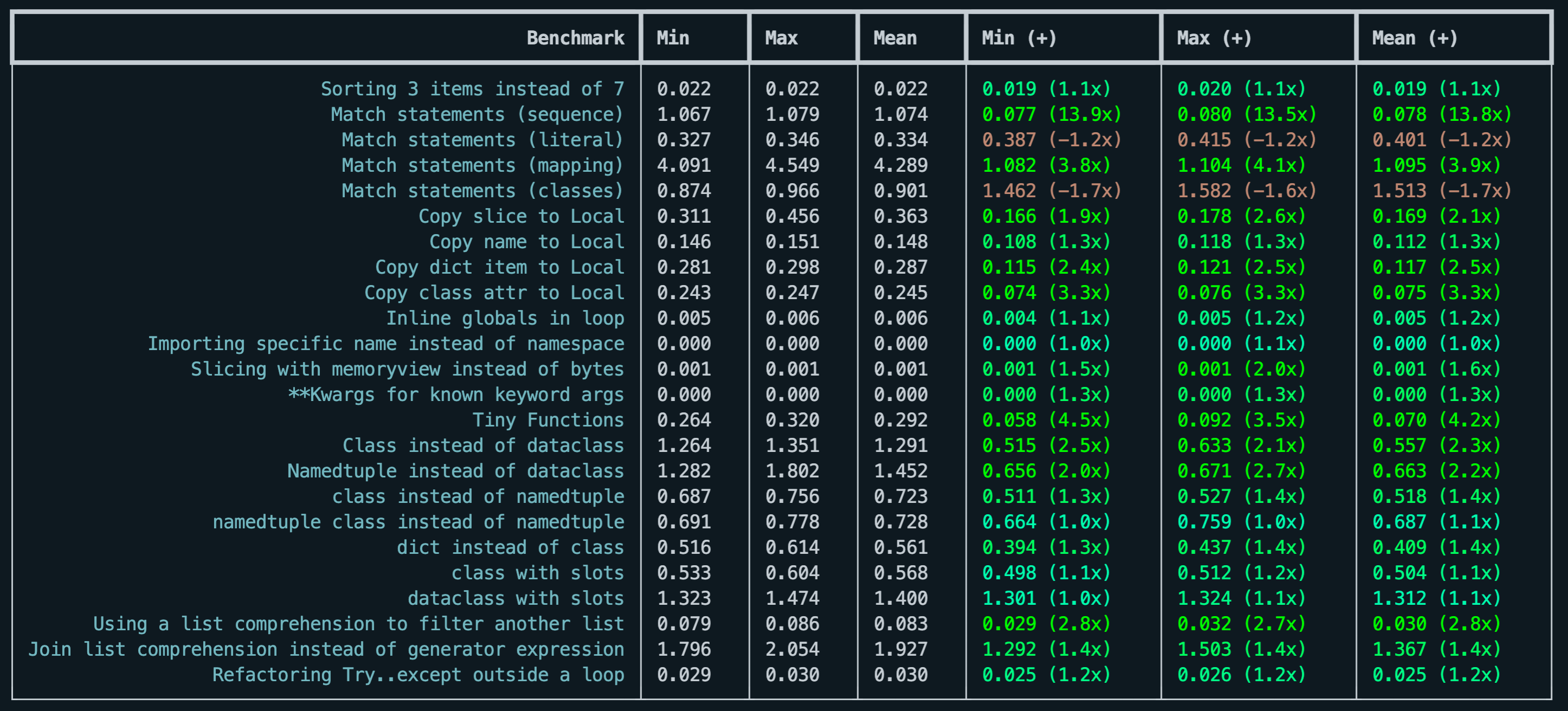Richbench,一个小型基准测试工具
项目描述
rich-bench
一个小型的Python基准测试工具。
我为什么需要这个?
Python内置的timeit模块很棒,但典型的小型基准测试用法是运行一个像这样的小脚本:
python -m timeit "a = 1; b = 2; a * b"
这种方法的缺点是编译后的代码是一个模块,因此顶层上的任何变量都是全局变量。编译后的字节码与在局部作用域(例如方法或函数)中执行相同的语句不同。在CPython中,它们的行为和性能差异很大。
richbench鼓励你在函数内编写基准测试,以正确模拟生产代码的闭包和作用域。
安装
需要Python 3.6+,可以使用pip进行安装
pip安装richbench
使用方法
在目录中编写基准测试函数,并使用该目标运行richbench以获取结果
$ richbench my_benchmarks/
结果以如下表格形式显示
$ richbench --help
usage: richbench [-h] [--profile] [--percentage] [--markdown] [--benchmark [BENCHMARK]] [--repeat REPEAT] [--times TIMES] target [target ...]
positional arguments:
target
options:
-h, --help show this help message and exit
--profile Profile the benchmarks and store in .profiles/
--percentage Show percentage of improvement instead of multiplier
--markdown Prints a markdown friendly table
--benchmark [BENCHMARK]
Run specific benchmark
--repeat REPEAT Repeat benchmark this many times
--times TIMES Run benchmark this many times
编写基准测试
基准测试应该在目录中,并且必须具有bench_{name}.py的文件名。
基准测试文件中的最后一行应该是名为__benchmarks__的列表,其中包含包含以下内容的元组列表:
- 函数a
- 函数b
- 基准测试的名称
def sort_seven():
"""Sort a list of seven items"""
for _ in range(10_000):
sorted([3,2,4,5,1,5,3])
def sort_three():
"""Sort a list of three items"""
for _ in range(10_000):
sorted([3,2,4])
__benchmarks__ = [
(sort_seven, sort_three, "Sorting 3 items instead of 7")
]
基准测试提示
在您的基准测试函数内部尝试以下操作:
- 一次性运行设置命令
- 尽可能多地重复您要基准测试的代码以创建一个稳定的基准测试
对于微型基准测试,这可以通过调用1000 - 100,000次来实现。
如果您的基准测试代码在0.001s内完成,则很可能会因为CPU执行其他活动而导致基准测试不稳定。增加函数内目标代码运行的次数。
性能分析
通过在命令行中添加--profile标志,它将生成一个子目录.profiles,其中包含目标函数的HTML配置文件。
项目详情
下载文件
下载适合您平台文件的文件。如果您不确定选择哪个,请了解更多关于安装包的信息。
源代码分发
richbench-1.0.3.tar.gz (1.1 MB 查看哈希值)
构建分发
richbench-1.0.3-py3-none-any.whl (5.2 kB 查看哈希值)
关闭
richbench-1.0.3.tar.gz的哈希值
| 算法 | 哈希摘要 | |
|---|---|---|
| SHA256 | 744afa3e78cbd919721042c11f7b7f9d2f546cebb3333d40290c4a0d88791701 |
|
| MD5 | 7fecc5eaff5e15fdad344fabba1e6d6b |
|
| BLAKE2b-256 | 9e5bd400ecddd716348ff7eac2a40df67cde1c9b60b1f7083577605db4bd4b31 |
关闭
richbench-1.0.3-py3-none-any.whl的哈希值
| 算法 | 哈希摘要 | |
|---|---|---|
| SHA256 | f52651cc0e0069a1355c5ed8cda214cb3f8961e7aaa431e440071d30f62e3e55 |
|
| MD5 | 46c2ab4bbe33c060a6e4563445b8e051 |
|
| BLAKE2b-256 | caa2725f87821d93f82cba818037fba0b86b14c721d75d4e9935b441ced8471f |




